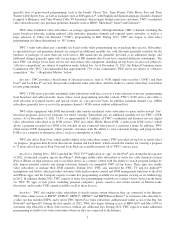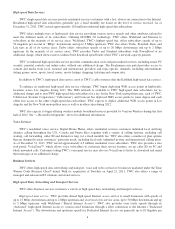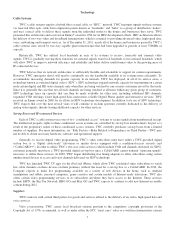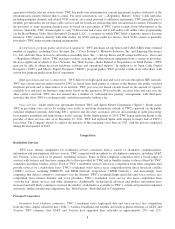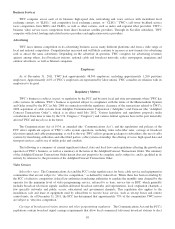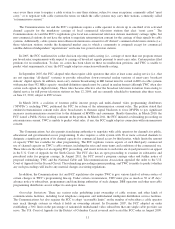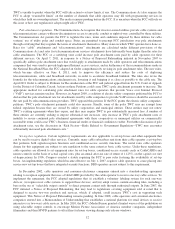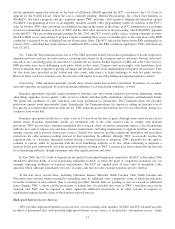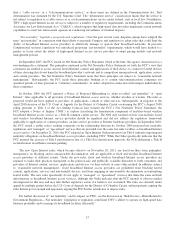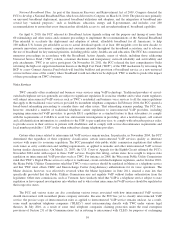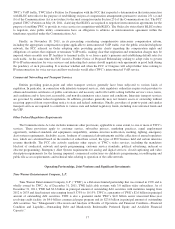Time Warner Cable 2011 Annual Report Download - page 21
Download and view the complete annual report
Please find page 21 of the 2011 Time Warner Cable annual report below. You can navigate through the pages in the report by either clicking on the pages listed below, or by using the keyword search tool below to find specific information within the annual report.In November 2009, in its National Broadband Plan proceeding, the FCC identified a set-top box “innovation gap” that it
stated could hinder the convergence of video, TV and IP-based technology. In December 2009, the FCC launched two
proceedings, seeking comment on improvements for CableCARDs and longer term measures to encourage innovation in the
market for navigation devices, such as requiring MVPDs and consumer electronics manufacturers to develop a universal “all-
video” adapter. In October 2010, the FCC adopted an Order to address CableCARD issues. The new rules included
requirements that cable operators provide reasonable access to switched digital programming for retail one-way devices
through a technology of the operator’s choice, provide credits to customers who use their own retail set-top boxes rather than
renting and allow self-installation of CableCARDs. The Order also granted relief to cable operators by eliminating the
requirement for certain connectors on HD set-top boxes in favor of alternative outputs and allowing operators to deploy
low-end HD set-top boxes that do not include CableCARDs. The universal “all-video” adapter notice of inquiry proceeding
remains pending. If the FCC requires MVPDs to develop an “all-video” adapter, it may impede innovation in this area.
Multiple dwelling units and inside wiring. In November 2007, the FCC adopted an order declaring null and void all
exclusive access arrangements between cable operators and multiple dwelling units and other centrally managed real estate
developments (“MDUs”). In connection with the order, the FCC also issued a Further Notice of Proposed Rulemaking
regarding whether to expand the ban on exclusivity to other types of MVPDs in addition to cable operators, including DBS
providers, and whether to expand the scope of the rules to prohibit exclusive marketing and bulk billing agreements. The
U.S. Court of Appeals for the District of Columbia Circuit upheld the order in May 2009. The FCC also has adopted rules
facilitating competitors’ access to the cable wiring inside such MDUs. This order, which was upheld by the U.S. Court of
Appeals for the District of Columbia Circuit in October 2008, could have an adverse impact on TWC’s business because it
allows competitors to use wiring inside MDUs that TWC has already deployed.
Copyright regulation. TWC’s cable systems provide subscribers with, among other things, content from local and
distant television broadcast stations. TWC generally does not obtain a license to use the copyrighted performances contained
in these stations’ programming directly from program owners. Instead, in exchange for filing reports with the U.S. Copyright
Office and contributing a percentage of revenue to a federal copyright royalty pool, cable operators obtain rights to retransmit
copyrighted material contained in broadcast signals pursuant to a statutory license. The elimination or substantial
modification of this statutory copyright license has been the subject of ongoing legislative and administrative review, and, if
eliminated, modified or interpreted by the U.S. Copyright Office differently, could adversely affect TWC’s ability to obtain
suitable programming and could substantially increase TWC’s programming costs.
In addition, when TWC obtains programming from third parties, TWC generally obtains licenses that include any
necessary authorizations to transmit the music included in it. When TWC creates its own programming and provides various
other programming or related content, including local origination programming and advertising that TWC inserts into cable-
programming networks, TWC is required to obtain any necessary music performance licenses directly from the rights
holders. These rights are generally controlled by three music performance rights organizations, each with rights to the music
of various composers. TWC generally has obtained the necessary licenses, either through negotiated licenses or through
procedures established by consent decrees entered into by some of the music performance rights organizations.
Program carriage and Adelphia/Comcast Transactions Order. The Communications Act and the FCC’s “program
carriage” rules restrict cable operators and MVPDs from unreasonably restraining the ability of an unaffiliated programming
vendor to compete fairly by discriminating against the programming vendor on the basis of its non-affiliation in the selection,
terms or conditions for carriage. The Adelphia/Comcast Transactions Order imposes certain additional program carriage
conditions on TWC, which will expire in July 2012, related to RSNs. In particular, the Adelphia/Comcast Transactions Order
provides that (i) neither TWC nor its affiliates may offer an affiliated RSN on an exclusive basis to any MVPD; (ii) TWC
may not unduly or improperly influence the decision of any affiliated RSN to sell programming to an unaffiliated MVPD or
the prices, terms and conditions of sale of programming by an affiliated RSN to an unaffiliated MVPD; (iii) if an MVPD and
an affiliated RSN cannot reach an agreement on the terms and conditions of carriage, the MVPD may elect commercial
arbitration to resolve the dispute; (iv) if an unaffiliated RSN is denied carriage by TWC, it may elect commercial arbitration
to resolve the dispute in accordance with the FCC’s program carriage rules; and (v) with respect to leased access, if an
unaffiliated programmer is unable to reach an agreement with TWC, that programmer may elect commercial arbitration to
resolve the dispute, with the arbitrator being required to resolve the dispute using the FCC’s existing rate formula relating to
pricing terms. The FCC has suspended this “baseball style” arbitration procedure as it relates to TWC’s carriage of
unaffiliated RSNs, although it allowed the arbitration of a claim brought by the Mid-Atlantic Sports Network (“MASN”)
because the claim was brought prior to the suspension. In that case, in December 2010, the FCC reversed the earlier decision
of the FCC’s Media Bureau and found that TWC had legitimate reasons for its carriage decisions regarding MASN and had
13


